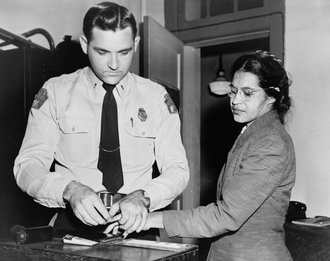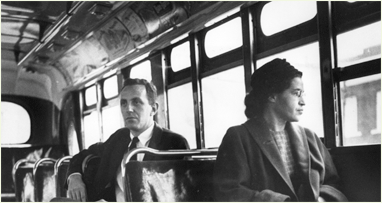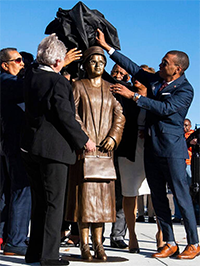|
Montgomery Statue Honors Civil Rights Pioneer Rosa Parks
December 1, 2019
On Rosa Parks Day, the city of Montgomery, Ala., unveiled a statue to the civil rights pioneer. It was on Dec. 1, 1955 that the courageous and admittedly "very tired" Parks refused to give up her seat on a public bus to a white man. She was sitting the section designated for nonwhite people, but an overflow of white passengers prompted the bus driver to increase the size of the "whites only" section. According to the laws in Alabama at the time, the white man who wanted the seat that Parks was occupying was within his rights to have it and she was supposed to move. She refused, the driver called police, and she was arrested and jailed and paid a $14 fine. One of the main results of Rosa's arrest and conviction was the attention the events involving her got from around the country. Martin Luther King, Jr., a minister from Atlanta and a strong civil rights leader, came to Montgomery and joined what would become a very successful boycott of the city buses. African-Americans were encouraged not to ride the city buses; instead, they walked or rode bicycles or carpooled or found some other way to get around the city. The boycott cost the city lots of money, since African-Americans made up 75 percent of the passengers who traveled on the city buses. Businesses downtown began to lose money as well, since African-Americans chose to shop closer to home. The boycott also got national attention and led to other civil rights protests. This bus boycott lasted 381 days and even got the Supreme Court's attention. The Court ruled in 1956 that segregation (separation based on race) on city buses was unconstitutional. One of the first things Rosa Parks did after this ruling was get on a Montgomery city bus. She sat right up front. The statue is near the Rosa Parks Library and Museum and about 30 feet from the very spot where Parks boarded the bus on that day all those years ago. She went on to become a leading voice in the Civil Rights movement. She took part in the Selma-to-Montgomery marches in March 1965 and later said that she revered the methods of both King and Malcolm X. She received the Congressional Gold Medal in 1999. Parks died in 2005. She was the first woman ever to lie in state at the U.S. Capitol. The city of Montgomery also unveiled four historic markers to commemorate the four plaintiffs in the U.S. Supreme Court decision Browder v. Gayle, which ruled the Montgomery bus segregation laws unconstitutional. Mary Louise Smith, one of the plaintiffs, was on hand for the ceremony, as was Fred Gray, the attorney who argued the Browder case and also defended Parks. Speaking at the Parks memorial event were Alabama Gov. Kay Ivey and Steven Reed, who earlier this year became the city's first African-American mayor. The state's lawmakers voted in 2018 to designated December 1 as Mrs. Rosa L. Parks Day statewide. |
Social Studies for Kids |
Social Studies for Kids
copyright 2002–2024
David White







